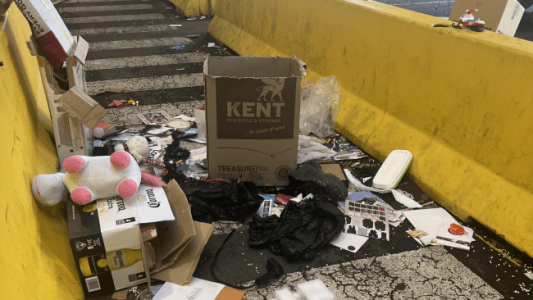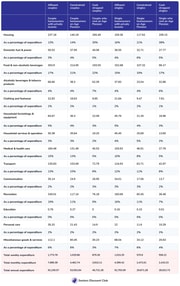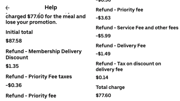Aussies called out for ‘gross’ weekend habit—are you guilty of it?
By
Gian T
- Replies 0
It’s a scene all too familiar for many Aussies: the weekend winds down, the city’s buzz fades, and what lingers isn’t just memories of good times—it’s rubbish scattered across streets, parks, and public spaces.
A Monday morning stroll often comes with the rustle of chip packets and the glint of empty bottles, leaving many to wonder: when did this become the norm?
Sydney, in particular, has found itself in the spotlight after locals took to social media to vent their frustration over the state of the city’s streets following another busy weekend.
Videos and photos of litter-strewn areas near Wynyard station and the aftermath at Flemington Markets have sparked a heated debate: who’s really to blame for this mess?
One Sydneysider summed up the mood with a video captioned, 'B-Line after a night out, disgusting.'
The footage showed rubbish scattered everywhere, a sight echoed by another local who posted a photo of Flemington Markets buried under piles of trash.
'Why is it so littered in Flemington Markets?' they asked, voicing a question many of us have probably wondered ourselves.
The reaction online was swift and, frankly, a bit brutal. 'This has legit been happening forever, the people who do this are always pissed and don’t give a [hoot],' one commenter wrote.
Others chimed in with, 'People are grubs,' and 'What a bunch of bastards…'—clearly, patience is wearing thin.
But not everyone is pointing the finger at partygoers and market shoppers. Some say the real issue is a lack of bins—or bins that are already overflowing by the time the crowds arrive.
'More bins would go a very long way, so would changing them more often. Guarantee the one that’s nearby is probably overflowing,' one person suggested.
Another added, 'It’s often awkward finding a bin. They need to make sure they clean them, probably have a run at 10 pm or something to make sure the bins are all empty for the peak rush of Saturday night. More effort can be made.'
Others highlighted the role of market organisers and local councils, noting that 'markets don’t hire cleaners anymore and just blame vendors/people,' and that sometimes, the mess is simply a matter of timing—photos snapped before the cleaners have had a chance to do their rounds.
While Sydney’s struggles have made headlines, this isn’t just a Harbour City problem. Littering is a nationwide issue, from Melbourne’s laneways to Brisbane’s riverside parks.
According to Keep Australia Beautiful, littering rates have plateaued in recent years, with beverage containers, food wrappers, and cigarette butts among the most common offenders. Despite decades of anti-litter campaigns, it seems old habits die hard.
It’s easy to blame 'grubs' or 'bastards,' but the psychology of littering is a bit more complex.
Studies show people are more likely to litter when bins are scarce, when they see others doing it, or when they feel anonymous in a crowd.
Alcohol and late-night revelry don’t help, either—let’s be honest, we’ve all seen (or been) someone who’s a bit less careful after a few drinks.
Local councils and event organisers are trying to tackle the problem with more bins, better signage, and increased cleaning crews.
Some markets and festivals now have 'Green Teams' who roam the grounds collecting rubbish and encouraging punters to do the right thing.
There are even apps that let you report overflowing bins or litter hotspots to your local council.
But at the end of the day, it comes down to personal responsibility. If you can carry your groceries home, you can carry your rubbish to the next bin.
And if you see someone else doing the wrong thing, a gentle reminder (or a pointed glare) can go a long way.
 Have you noticed an increase in litter in your area? Do you think the problem is a lack of bins, not enough cleaners, or just plain laziness? Have you got any tips for encouraging others to do the right thing? Share your thoughts, stories, and solutions in the comments below.
Have you noticed an increase in litter in your area? Do you think the problem is a lack of bins, not enough cleaners, or just plain laziness? Have you got any tips for encouraging others to do the right thing? Share your thoughts, stories, and solutions in the comments below.
Read more: New permit rule targets kerbside bin habits under council crackdown
A Monday morning stroll often comes with the rustle of chip packets and the glint of empty bottles, leaving many to wonder: when did this become the norm?
Sydney, in particular, has found itself in the spotlight after locals took to social media to vent their frustration over the state of the city’s streets following another busy weekend.
Videos and photos of litter-strewn areas near Wynyard station and the aftermath at Flemington Markets have sparked a heated debate: who’s really to blame for this mess?
One Sydneysider summed up the mood with a video captioned, 'B-Line after a night out, disgusting.'
The footage showed rubbish scattered everywhere, a sight echoed by another local who posted a photo of Flemington Markets buried under piles of trash.
'Why is it so littered in Flemington Markets?' they asked, voicing a question many of us have probably wondered ourselves.
The reaction online was swift and, frankly, a bit brutal. 'This has legit been happening forever, the people who do this are always pissed and don’t give a [hoot],' one commenter wrote.
Others chimed in with, 'People are grubs,' and 'What a bunch of bastards…'—clearly, patience is wearing thin.
But not everyone is pointing the finger at partygoers and market shoppers. Some say the real issue is a lack of bins—or bins that are already overflowing by the time the crowds arrive.
'More bins would go a very long way, so would changing them more often. Guarantee the one that’s nearby is probably overflowing,' one person suggested.
Another added, 'It’s often awkward finding a bin. They need to make sure they clean them, probably have a run at 10 pm or something to make sure the bins are all empty for the peak rush of Saturday night. More effort can be made.'
While Sydney’s struggles have made headlines, this isn’t just a Harbour City problem. Littering is a nationwide issue, from Melbourne’s laneways to Brisbane’s riverside parks.
According to Keep Australia Beautiful, littering rates have plateaued in recent years, with beverage containers, food wrappers, and cigarette butts among the most common offenders. Despite decades of anti-litter campaigns, it seems old habits die hard.
It’s easy to blame 'grubs' or 'bastards,' but the psychology of littering is a bit more complex.
Studies show people are more likely to litter when bins are scarce, when they see others doing it, or when they feel anonymous in a crowd.
Local councils and event organisers are trying to tackle the problem with more bins, better signage, and increased cleaning crews.
Some markets and festivals now have 'Green Teams' who roam the grounds collecting rubbish and encouraging punters to do the right thing.
There are even apps that let you report overflowing bins or litter hotspots to your local council.
But at the end of the day, it comes down to personal responsibility. If you can carry your groceries home, you can carry your rubbish to the next bin.
And if you see someone else doing the wrong thing, a gentle reminder (or a pointed glare) can go a long way.
Key Takeaways
- Sydney locals have called out the ongoing problem of rubbish littering city streets after busy weekends, describing the situation as 'filthy' and 'disgusting'.
- Many social media users blamed careless people for the mess, labelling those who litter as 'grubs' and expressing frustration that the issue isn’t improving.
- Others argued that a lack of bins, overflowing rubbish bins, and insufficient cleaners—especially at places like markets—are contributing factors to the rubbish problem.
- While limited facilities may play a role, the message remains for individuals to make more of an effort and always find a bin for their rubbish.
Read more: New permit rule targets kerbside bin habits under council crackdown








